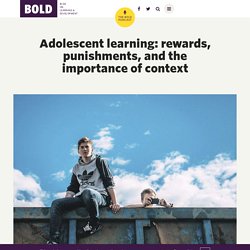

Skinner developed the Theory of Operant Conditioning, a method of learning that is built on the foundation of reinforcement and punishment. Human beings often associated behaviour to consequences. When we are rewarded for a behaviour, that behaviour is reinforced; when we are punished for a behaviour, that behaviour tend to diminish. Operant Conditioning. Skinner’s Operant Conditioning: Rewards & Punishments. Operant conditioning.
Reinforcement and Punishment. Difference Between Reinforcement and Punishment (with Examples and Comparison Chart) - Key Differences. Reinforcement.
Negative Reinforcement. Schedules of Reinforcement. Understanding the Schedules of Reinforcement. Predictability of Reinforcement. Choosing the Appropriate Schedule Punishment. Positive Punishment. Negative Punishment. Tips for Parents. Rewarding behavior is key to parenting teens, study suggests. Parenting is hard, and parenting teens brings about an entirely new set of challenges, from keeping their rooms clean to getting them home before curfew.

But, a new study suggests parents who want their teenagers to keep their grades up could have better success if they focus more on rewarding good behavior and less on threatening to punish the bad. According to the report, published in PLOS Computational Biology, British researchers have found that adolescents focus well on positive incentives, but have difficulty staying motivated to avoid penalties. Adolescent learning: rewards, punishments, and the importance of context: BOLD. Adolescents’ unique sensitivity to rewards is thought to be due to increased activity in and communication between areas of the brain that respond to rewards.

However, we also know that many of the same brain areas also respond to punishment and that there are dynamic changes occurring throughout the brain during adolescence. Much like the complexity of brain development, the story about how adolescents learn from reinforcement might not be so simple. “The way that adolescents learn from the choices that they have made in the past will ultimately influence their future choices and actions.” An in-depth review of studies examining how we learn from reinforcement across age shows mixed results. The Use of Reinforcement and Punishment in Shaping a Child's Behavior. Conclusion.